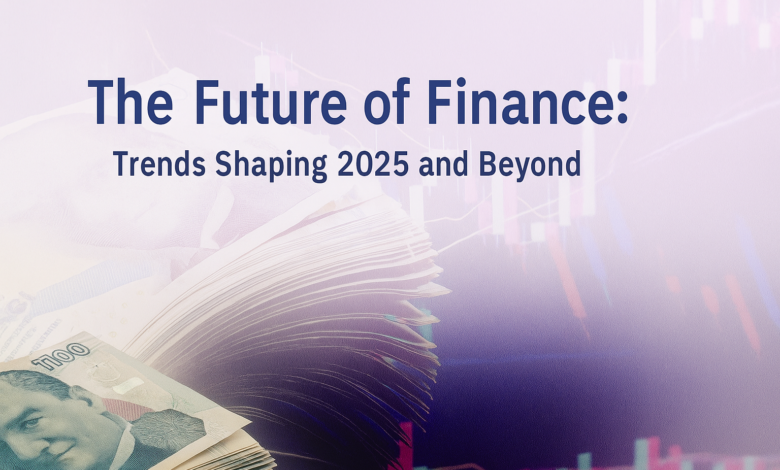
Finance is standing at a turning point. What was once a sector defined by rigid systems, legacy institutions and paper-heavy processes is now rapidly evolving into a digital-first, technology-driven ecosystem. In 2025 and the years to follow, the financial industry will be shaped by bold innovations, shifting market expectations and the urgent need for sustainability and resilience. Five key forces are driving this transformation, digital transformation in finance, Blockchain in finance, sustainable finance strategies, Decentralized finance (DeFi) growth and future investment strategies. These trends are not isolated, they intersect and reinforce each other, creating a new financial landscape that demands adaptability from both businesses and investors.
Digital Transformation in Finance
Digital transformation in finance is perhaps the most immediate and visible shift. Traditional banks and financial institutions are no longer competing only with each other, they are also facing competition from fintech startups and big tech companies that offer lightning-fast services and user-friendly digital experiences. Financial organizations are integrating advanced technologies to automate once-manual tasks, from processing loan applications to detecting fraud in real time. Artificial Intelligence and Machine learning are becoming essential for credit scoring, market analysis and predictive risk modeling. Even customer service is being reshaped through AI-powered virtual assistants that can answer questions instantly, 24/7. Open banking frameworks are another cornerstone of this transformation. They allow third-party developers to securely access banking data with customer consent, fueling a surge of innovative financial products and services. This open, connected ecosystem is dismantling the old siloed approach to banking and pushing institutions toward greater agility and customer-centricity. As digital transformation deepens, financial organizations that embrace data-driven decision-making and seamless digital experiences will outpace competitors who cling to outdated systems. It is becoming clear that in the near future, technology will not just support finance, it will define it.
Blockchain in Finance
Alongside digital transformation, Blockchain in finance is quietly revolutionizing the backbone of the industry. Initially designed to power Bitcoin, blockchain has matured into a versatile infrastructure for secure, transparent and decentralized transactions. One of its most transformative impacts lies in cross-border payments. Traditional systems often take days and involve multiple intermediaries, adding both cost and complexity. Blockchain-based networks can settle transactions in minutes with far lower fees. Similarly, smart contracts like self-executing agreements written in code remove the need for third-party verification, reducing both risk and administrative burden. Another major development is the tokenization of real-world assets. Real estate, stocks, bonds and even art can be represented as digital tokens on a blockchain, enabling fractional ownership and enhancing liquidity. This opens investment opportunities to a broader pool of participants, not just institutional investors. Looking forward, blockchain is poised to become a core layer of financial infrastructure. It promises to cut costs, strengthen security and expand access to capital particularly in underserved regions where traditional banking infrastructure is weak. As trust becomes programmable and transparent, the financial world may shift from relying on centralized authorities to decentralized networks governed by code.
Sustainable Finance Strategies
While technology accelerates change, ethical responsibility is also reshaping financial priorities. Sustainable finance strategies are moving from optional to essential as climate change and social impact become central to business and investment decisions. Investors are increasingly directing capital toward companies and projects that prioritize environmental, social and governance like Environmental, Social and Corporate Governance standards. Green bonds, which fund renewable energy or climate resilience projects, are growing rapidly. Asset managers now routinely evaluate ESG scores when constructing portfolios, rewarding businesses that demonstrate sustainability commitments and penalizing those that lag behind. Regulators are also driving this shift by mandating clearer sustainability disclosures. Financial institutions are being pushed to measure and report the environmental and social consequences of their activities. This greater accountability is influencing risk assessments, loan approvals and even insurance pricing. By 2025, sustainability will not simply be a marketing advantage. It will be a fundamental part of financial strategy. Organizations that fail to integrate sustainable finance principles may find themselves locked out of capital markets or facing higher costs of borrowing. Those that succeed will be better positioned to capture long-term value while contributing to global climate goals.
Decentralized Finance (DeFi) Growth
Perhaps the boldest and most disruptive trend is the rise of Decentralized finance (DeFi). DeFi refers to a blockchain-based ecosystem of financial services that operate without traditional intermediaries like banks or brokers. DeFi platforms enable users to contribute, swipe, trade and accrue interest directly by smart agreements. Because they are permissionless, anyone with an internet connection can participate without needing approval from banks or regulators. Every transaction is recorded on a public ledger, creating an unprecedented level of transparency. While DeFi is still relatively young and volatile, its growth has been explosive. It challenges centuries-old assumptions about how financial systems should work, raising questions about regulation, security, and systemic risk. Yet the potential is undeniable, DeFi could lower barriers to financial access, reduce costs by removing middlemen and return more control to individual users. As regulators begin to create clearer frameworks for DeFi, the sector could mature into a mainstream pillar of global finance. It represents a radical rethinking of the financial system one built on open code rather than closed institutions.
Future Investment Strategies
These technological and ethical shifts are also redefining how people invest. Future investment strategies are evolving to reflect new risks, new asset classes and new sources of growth. Investors are increasingly adopting thematic strategies, focusing on sectors expected to shape the future such as clean energy, space exploration and AI-driven industries. Digital assets are becoming more accepted as part of diversified portfolios, including cryptocurrencies, tokenized securities and other blockchain-based instruments. At the same time, alternative investments like private equity, venture capital and infrastructure are gaining traction as investors seek resilience in volatile markets. Advanced analytics and AI-driven portfolio tools are also reshaping how investments are managed, enabling real-time risk assessments and algorithmic decision-making. Tomorrow’s successful investors will need to blend traditional financial fundamentals with technological fluency. Understanding the dynamics of blockchain networks, ESG metrics and digital ecosystems will become just as critical as analyzing earnings reports or market cycles.
A Converging Future
What makes this period so remarkable is how interconnected these trends are. Digital transformation provides the foundation for blockchain systems and DeFi applications. Sustainable finance influences where capital flows, while AI-powered analytics help investors navigate increasingly complex markets. Each trend amplifies the others, accelerating the shift toward a more open, data-driven and values-conscious financial system. This convergence is dissolving the old boundaries between banks, fintech startups, tech companies and regulators. The future of finance will be defined not by isolated institutions but by interconnected networks and shared innovation.
Conclusion
The future of Finance is unfolding rapidly and it looks very different from the systems we have known for decades. In 2025 and beyond, the sector will be faster, smarter, greener and more decentralized. Businesses and investors that embrace these changes by adopting digital transformation in finance, leveraging Blockchain in finance, committing to sustainable finance strategies, exploring Decentralized finance growth and developing bold future investment strategies will be the ones who thrive. Finance is no longer just about managing money. It’s about building the digital, sustainable economy of tomorrow. Those prepared to adapt will lead the way.

